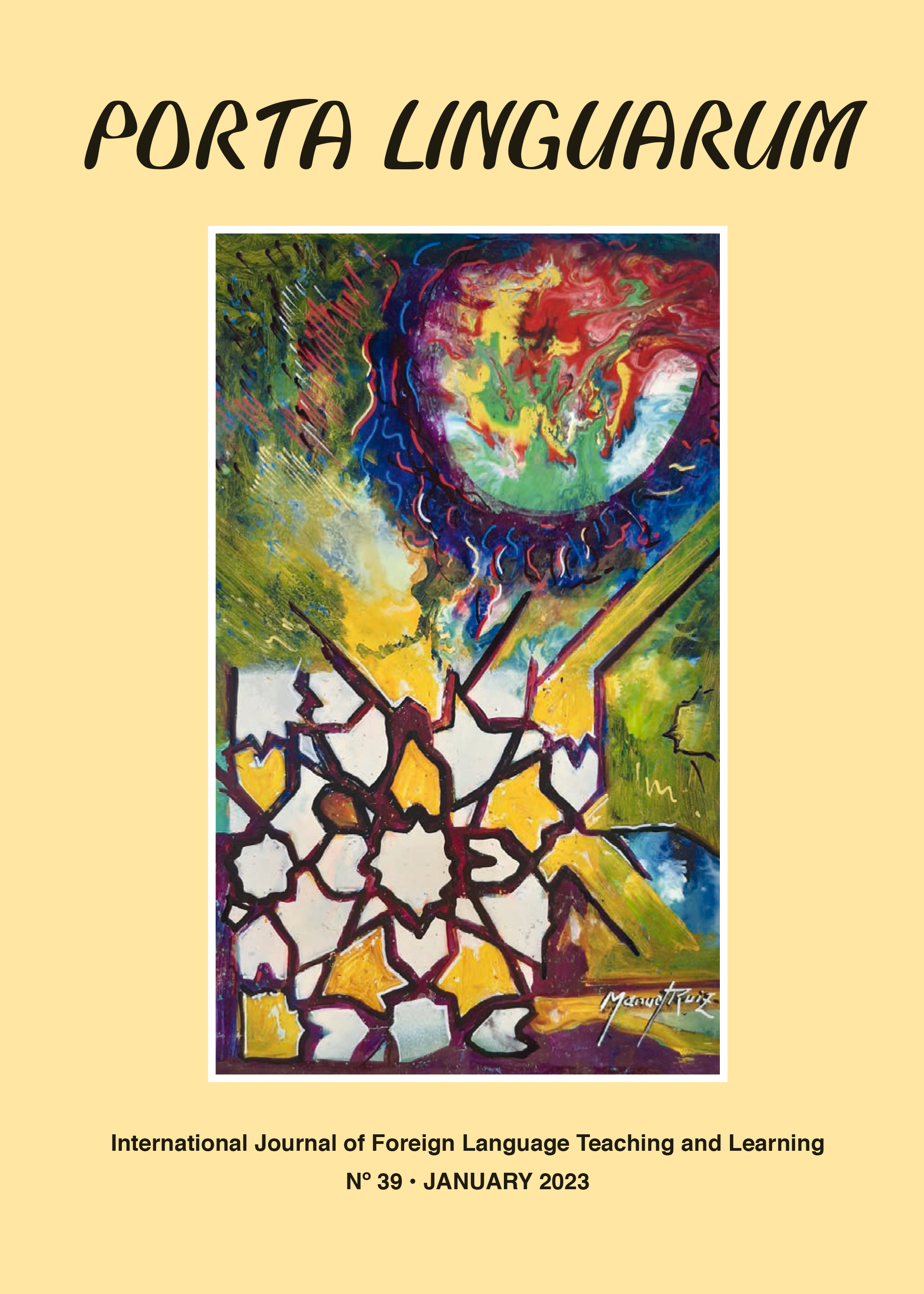Integration of corpus literacy consultation into language teacher education: Course design, implementation, and evaluation
DOI:
https://doi.org/10.30827/portalin.vi39.23885Keywords:
corpus literacy, corpus linguistics, language teacher education, evaluation, pre-service teachersAbstract
This qualitative study presents a corpus literacy course designed and implemented at an undergraduate language teacher education program in Turkey, and its evaluation by pre-service ELT teachers. The course introduces the main concepts of corpus linguistics, raises future teachers’ linguistic and pedagogical awareness through corpus applications, and introduces them to corpus-informed practices to improve their pedagogical skills. In the first phase of the study, students’ corpus literacy levels were determined through a pre-course survey revealing that most of the participants did not know about corpora and their uses. The second and third phases were devoted to evaluating the course. Initially, student teachers were asked to write minute papers and reflection papers during the semester to evaluate the process. In the final phase, semi-structured interviews and focus group discussions were conducted after the course to explore their overall evaluations. Findings implied that corpus literacy integration into teacher education programs clearly yields positive outcomes, yet only one course is not enough to popularize it among EFL teachers. Hence, extensive exposure to corpus literacy and curriculum-wide integration in the TEFL programs could contribute to its popularization among future practitioners.
Downloads
References
Abdel Latif, M. (2021) Corpus literacy instruction in language teacher education: Investigating Arab EFL student teachers’ immediate beliefs and long-term practices. ReCALL, 33(1): 34-48. https://doi.org/10.1017/S0958344020000129
Aşık, A. (2017) A sample implementation of corpus integration through coursebook evaluation: Implications for language teacher education. Journal of Language and Linguistic Studies, 13(2): 728-740.
Bennett, G. R. (2010). Using corpora in the language learning classroom: Corpus linguistics for teachers. Michigan: University of Michigan Press.
Boulton, A. (2010) Learning outcomes from corpus consultation. In Moreno Jaén, M., Serrano Valverde, F. & Calzada Pérez, M. (eds.), Exploring new paths in language pedagogy: Lexis and corpus-Based language teaching. London: Equinox, 129-144. https://hal.archives-ouvertes.fr/hal-00502629v2
Breyer, Y. (2009) Learning and teaching with corpora: Reflections by student teachers. Computer Assisted Language Learning, 22(2): 153–172. https://doi.org/10.1080/09588220902778328
Fligelstone, S. (1993) Some reflections on the question of teaching, from a corpus linguistics perspective. ICAME Journal, 17: 97-109.
Callies, M. (2019) Integrating corpus literacy into language teacher education. In Götz, S. & Mukherjee, J. (eds.), Learner corpora and language teaching. John Benjamins Publishing Company, 245-263. https://doi.org/10.1075/slcs.201.12cal
Callies, M. (2016) Towards corpus literacy in foreign language teacher education: Using corpora to examine the variability of reporting verbs in English. In Kreyer, R., Schaub, S. & Gulderning, A. (eds.), Angewandte Linguistik in Schule und Hochschule (pp. 391–415). Frankfurt: Peter Lang, 391-415.
Chambers, A. (2019) Towards the corpus revolution? Bridging the research-practice gap. Language Teaching, 52(4): 1-16. https://doi.org/10.1017/S0261444819000089
Cohen, L., Manion, L., & Morrison, K. (2007) Research methods in education. Oxon:Routledge.
Çalışkan, G., & Kuru Gönen, S. İ. (2018) Training teachers on corpus-based language pedagogy: Perceptions on vocabulary instruction. Journal of Language and Linguistic Studies, 14(4): 190–210.
Ebrahimi, A., & Faghih, E. (2017). Integrating corpus linguistics into online language teacher education programs. ReCALL, 29(1), 120-135.
https://:doi.org/10.1017/S0958344016000070
Farr, F. (2010) How can corpora be used in teacher education? In O’Keeffe, A. & McCarthy, M. (eds.), Routledge handbook of corpus linguistics. London and New York: Routledge, 620-632.
Farr, F. (2008) Evaluating the use of corpus-based instruction in a language teacher education context: Perspectives from the users. Language Awareness, 17(1): 25–43. https://doi.org/10.2167/la414.0
Frankenberg-Garcia, A. (2012) Raising teachers’ awareness of corpora. Language Teaching, 45(4): 475–489. https://doi.org/10.1017/S0261444810000480
Girgin, U. (2019) Perceptions of Turkish EFL student teachers towards learning phrasal- prepositional verbs through corpus-based materials. Language Teaching and Educational Research (LATER), 2(1): 1-19. https://doi.org/10.35207/later.526730
Heather, J., & Helt, M. (2012) Evaluating corpus literacy training for pre-service language teachers: Six case studies. Journal of Technology and Teacher Education, 20(4): 415-440. https://www.learntechlib.org/primary/p/39324/
Heyvaert, L., & Laffut, A. (2008) Corpora in the teaching of English in Flemish secondary schools: current situation and future perspectives. Proceedings of the 8th Teaching and Language Corpora Conference. Associação de Estudos e de Investigação Cientifíca do ISLA Lisboa; Lisbon: 400-409.
Krippendorff, K. (2004) Content analysis: An introduction to its methodology. Thousand Oaks: Sage publications.
Leńko-Szymańska, A. (2017) Training teachers in data-driven learning: Tackling the challenge. Language Learning & Technology, 21(3): 217-241.
Leńko-Szymańska, A. (2014) Is this enough? A qualitative evaluation of the effectiveness of a teacher-training course on the use of corpora in language education. ReCALL, 26(2): 260–278. https://doi.org/10.1017/S095834401400010X
McCarthy, M., McCarten, J., & Sandiford, H. (2005) Touchstone series. Cambridge: Cambridge University Press.
McEnery, T., & Xiao, R. (2010) What corpora can offer in language teaching and learning. In Hinkel, E. (Ed.), Handbook of research in second language teaching and learning. Vol. 2, London & New York: Routledge, 364-380.
Mukherjee, J. (2004) Bridging the gap between applied corpus linguistics and the reality of English language teaching in Germany. In Applied Corpus Linguistics: A multidimensional perspective. Brill-Rodopi, 239-250. https://doi.org/10.1163/9789004333772_014
O’Keeffe, A., & Farr, F. (2003) Using language corpora in initial teacher education: Pedagogic issues and practical applications. TESOL Quarterly, 37(3): 389–418. https://doi.org/10.2307/3588397
Özbay, A. Ş. (2017) Turkish EFL English majors' perceptions towards the implementation of “Introduction To Corpus Linguistics” course in an English department in Turkey. Turkish Studies, 12(34): 307-322. http://dx.doi.org/10.7827/TurkishStudies
Özbay, A., & Kayaoğlu, M. N. (2015) EFL teacher’s reflections towards the use of computerized corpora as a teaching tool in their classrooms. Cukurova University Faculty of Education Journal, 44(1): 85-104. https://doi.org/10.14812/cuefd.54367
Poole, R. (2020) “Corpus can be tricky”: revisiting teacher attitudes towards corpus-aided language learning and teaching. Computer Assisted Language Learning:1-22. https://doi.org/10.1080/09588221.2020.1825095
Römer, U. (2010) Using general and specialized corpora in English language teaching: Past, present and future. In Campoy, M. C., Belles-Fortuno, B., Gea-Valor, M. L. (eds.), Corpus-based approaches to English language teaching. London: Continuum, 18-35.
Zareva, A. (2017) Incorporating corpus literacy skills into TESOL teacher training. ELT Journal, 71(1): 69–79. https://doi.org/10.1093/elt/ccw045



















